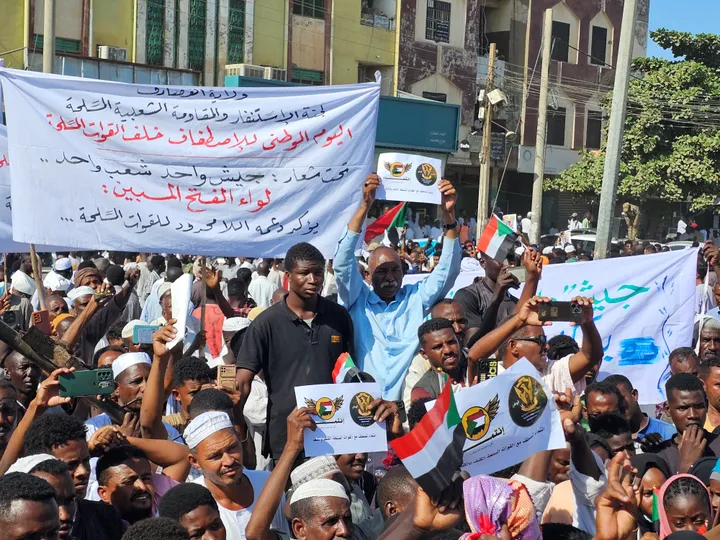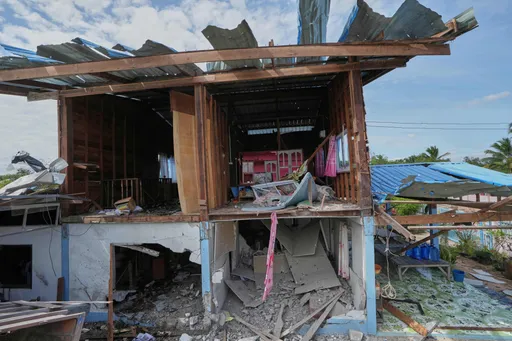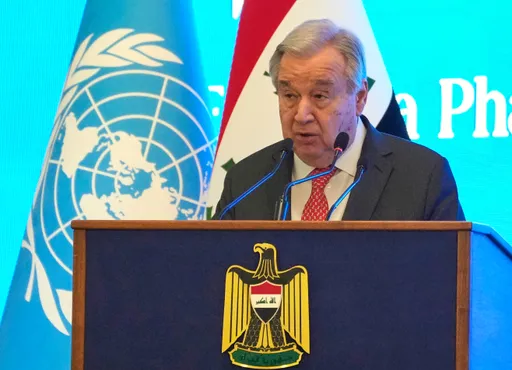LAGOS — Nigeria’s harsh economic conditions and armed conflicts have resulted in widespread food poverty, particularly in rural communities.
Rudith Harrison, an 80-year-old widow and her four grandchildren spent several weeks enduring pangs of hunger. Harrison was helpless coupled with the responsibility of taking care of the children her late daughter in-law, Itunu Harrison left behind during childbirth in 2017. “It was a heart-cracking experience for me and the children,” Harrison toldTRT World, as she settles into an armchair in her room. “We went several days without food, and there was no one to help.”
She came across as a nervous woman, even though she attempted to put on a brave face. “Things got worse when my son suddenly lost his senses after his wife's death,” she said.
But months after, things improved when she received some relief from a team of Chowberry, a cloud-based software application that connects retailers to low-income consumers, charity organisations and food-relief agencies in her community of Itedo, a slum settlement in the Lekki area of Lagos. “Weeks after that day didn't give way for starvation, we had enough packs of noodles, semolina, with a handful of rice grains that turned our situation around,” she said.
With her grandchildren gone to school, to return in the afternoon, she sat in a room with cream coloured walls. Her portrait hung inside the room. “The food items sustained us for more than five weeks,” she said. “The children fed from the noodles before leaving for school every morning.” Harrison's skin looks tanner than desert sands, her eyes were clouded with months of pain as she recalls the past. Her white top hangs loosely on her skeletal figure like a coat hung on a rack. The hunger seems to have worn her out.
Lagos is a sprawling city of countless slums and high rise buildings that are home to millions of people. From the entrance of Itedo community of Lekki in Lagos, it is easy to notice the class divide. A tarred road ends with a waterlogged footpath that serves as entrance to the slum community.
On the other hand, the terrace road is dotted with greenery from the entrance at Ikate, with an uninterrupted view of posh estates and high rise buildings inhabited by the wealthy elites of Lagos.
Nigeria has an estimated population of 13 million people suffering from hunger daily, and seven out of 10 survive on less than $1.25 a day, which is below the global poverty line of $1.90, according to the World Food Program (WFP). At least 86 million of Nigeria’s population live in extreme poverty, according to a 2017 World Bank report.
It’s a global problem facing a number of countries of the world. But with a billion people experiencing hunger, up to one-third of all food is destroyed post-harvest and through transportation, or is thrown away by consumers and stores, according to the UN’s Food and Agriculture Organisation (FAO).
In 2016, Nigeria slipped into a long spell of recession – the worst in the last 25 years – and is currently grappling with one of the worst humanitarian crises in the world – intensified by Boko Haram’s violent insurgency attacks in the northeast region. More than 4.7 million people are facing food insecurity in the region, according to the UN, while 49 percent of young people are either unemployed or underemployed or engaged in part-time work.
About two years after, the country came out of recession but it appears not to be palpable as many of the citizens still struggle to make above $1.90 per day. This was backed up by Theresa May, the British Prime Minister’s disturbing remark that Nigeria has the highest number of the world’s poor people, during her trade trip in Cape Town, South Africa in August 2017.
The revolution
However, Chowberry has raised some hopes. Developed by Oscar Ekponimo, a software engineer based in Abuja, Nigeria’s capital city, the app connects grocery stores and supermarkets with non-governmental organisations (NGOs) and charities to put waste foods to use. As packaged food comes close to expiry, the app initiates discounts that grow until the product is sold.
“I saw an opportunity to provide affordable nutrition to millions of people while providing retailers with a sustainable system for managing the end of shelf-life. This is a win-win solution,” he said.
Oscar conceptualized the idea for Chowberry in September 2013. Prior to developing it, he and a few friends occasionally distributed food to street kids and homeless persons. “I had a friend who worked at a nearby supermarket and discovered they throw away items that expire on their shelves and asked if they can donate it to us for distribution to impoverished households just before it expires and they agreed.”
This, he says, helped him automate the process by using his programming skills to develop the app. “That was how the whole idea of what Chowberry is came together,” he said. “Most of the research and early development was self-financed from my personal savings.”
Between 2017 and 2018, Chowberry assisted over 50,000 households across Nigeria, according to Oscar. The app receives 6,000 daily visits, and is pushing for the 100,000 mark by the end of 2019.
“We only help the NGO’s achieve more through our technology driven service,” he said. “Partnering NGOs are responsible for identifying communities, accessing and discovering the most vulnerable in the community.”
In 2016 Oscar was named Time magazine’s Next Generation Leaders of 2017. He was also a recipient of Rolex Award for Enterprise and of the UN-ITU Young Innovators Award.
Back in 2013, while studying computer science at the University of Calabar, Nigeria, he began organizing food drives. After winning the young innovator category of the 2013 International Telecommunications Union (ITU) award with a prototype that eventually guided the development of Chowberry, which saw him receive a $5,000 grant, Ekponimo officially launched the app a year later.
Eventually, he found a local charity, ThriftySlayer, a trademark of Slay Dot Com Aid Initiative.
Slay Dot Com Aid Initiative is a not-for-profit organization dedicated to creating programmes that provide succor to those with little or no recourse. It commenced operations in 2016 with a feeding programme that provided hot Sunday lunches to about 50 people at the Angwa-Zamalafiya Asokoro community in the Abuja suburbs, to combat modern day hunger. Today, that number has grown to about 250 to 270.
Slay Dot Com Aid Initiative runs soup kitchens that currently feed 200 in a low-resource settlement in Abuja on a weekly basis. The charity distributes food to random clusters of vulnerable people in various parts of the city, which brings the total number of persons fed to about 270 people each week.
“Our feeding program is part of a wider campaign to adopt pilot indigent communities by providing them basic care and provision,” said Chinelo Njemanze, Programme Director of Slay Dot Com Aid Initiative.
The partnership with Chowberry began mid-2017; the food app periodically sends its partner, Slay Dot Com Aid Initiative its stock list to make orders accordingly. The charity buys discounted items through Chowberry and distributes to indigents who are in need.
“We usually distribute cooked meals in the communities we work but with the variety of goods on offer,” Chinelo told TRT World.
“We are able to occasionally buy treats for the kids and prepare raw food packs for families.”
























